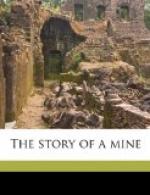The scene was weird enough without Wiles’s eye to add to its wild picturesqueness. The mountain towered above,—a heavy Rembrandtish mass of black shadow,—sharply cut here and there against a sky so inconceivably remote that the world-sick soul must have despaired of ever reaching so far, or of climbing its steel-blue walls. The stars were large, keen, and brilliant, but cold and steadfast. They did not dance nor twinkle in their adamantine setting. The furnace fire painted the faces of the men an Indian red, glanced on brightly colored blanket and serape, but was eventually caught and absorbed in the waiting shadows of the black mountain, scarcely twenty feet from the furnace door. The low, half-sung, half-whispered foreign speech of the group, the roaring of the furnace, and the quick, sharp yelp of a coyote on the plain below were the only sounds that broke the awful silence of the hills.
It was almost dawn when it was announced that the ore had fused. And it was high time, for the pot was slowly sinking into the fast-crumbling oven. Concho uttered a jubilant “God and Liberty,” but Don Jose Wiles bade him be silent and bring stakes to support the pot. Then Don Jose bent over the seething mass. It was for a moment only. But in that moment this accomplished metallurgist, Mr. Joseph Wiles, had quietly dropped a silver half dollar into the pot!
Then he charged them to keep up the fires and went to sleep—all but one eye.
Dawn came with dull beacon fires on the near hill tops, and, far in the East, roses over the Sierran snow. Birds twittering in the alder fringes a mile below, and the creaking of wagon wheels,—the wagon itself a mere cloud of dust in the distant road,—were heard distinctly. Then the melting pot was solemnly broken by Don Jose, and the glowing incandescent mass turned into the road to cool.
And then the metallurgist chipped a small fragment from the mass and pounded it, and chipped another smaller piece and pounded that, and then subjected it to acid, and then treated it to a salt bath which became at once milky,—and at last produced a white something,—mirabile dictu!—two cents’ worth of silver!




